If I never visited the garden in the morning, I wouldn't know that chicory produces blooms of an enchanting blue. In the cool, dewy morning the garden is peppered with their cornflower hue. By late morning, most have faded, and by the heat of afternoon they are reduced to dry, brown husks.
The midday garden is very different from the morning garden. It is a place of heat and harsh light. Clouds of bees and flies swarm the garish yellows and reds of cup plant and bee balm, and hummingbirds buzz the gladiolus. Heat-loving butterflies flit and the leaves of squash plants droop. Humans scurry in to search for fresh ingredients and exit quickly, returning to the dim of the kitchen and the comfort of the fan.
By late afternoon, cool breezes bring a Mediterranean feel. The party is over for the bees, who are drunk on nectar and passing out inside blossoms, but just beginning for the humans, who can now relax and enjoy a cold beverage. The gentle light is restful to the eyes, and brings out the many shades of green and endless textures of foliage.
The location is always the same, but one never visits the same garden twice. Not only do plants grow and change as they flower and fruit, but temperature, humidity, sun angle, cloud cover and myriad other factors interact in a way will never be exactly repeated. And it's not just the potager that exhibits constant change as it goes from a relatively empty space to jungle in a few months time. The surrounding land — pasture, orchard, wetland, and regenerating forest — is always changing as well. Higher quality forage is beginning to dominate in the grazing paddocks with the constant addition of manure. The vegetative make-up also varies throughout the season, and fluctuates in response to rainfall.
Many tons of living biomass are added each year as the tulip poplars and sycamores reach for the sky and pawpaw trees and sumac patches shoot up on the Savanna. Though it may not always be so, summers here are incredibly wet, meaning growth is rampant. Wild blackberry canes reach out and block paths seemingly overnight. The strip between the pasture fence and the woods is suddenly filled with questing box elder branches reaching out for sun.
In my view, this constant change is what makes the garden and the surrounding land such an amazing place. I'd like to believe that the evolving nuances of the garden would be enjoyable to almost everyone. Even a plant like chicory whose blooms fade by noon has its charms, and adds to the magic of the garden. The burgeoning growth of the wilder areas can present challenges and might require of us some non-judgmental introspection to reach acceptance. While it's frustrating to have to weed, mow, and clear paths constantly, the pros of rapid growth outweigh the cons. The way the forest leaps up shows how quickly the land can heal when we allow it to. The shocking glut of vegetables begging to be picked can feel overwhelming, but demonstrates how large harvests can be pulled from relatively small spaces.
On the flipside, the need for certainty and sameness is apparent in the manicured shrubs and neat borders of typical landscapes. What sets them apart from regenerative and permaculture landscapes isn't primarily their need for constant chemical care, but the fact that they are static. Growth and change happen, but they are problems that must be dealt with by spraying and pruning, acts which poison and produce waste rather than a harvest. The value of such landscapes inheres in their stasis — tidy shrubs that keep their spherical shapes, roses that bloom all summer, leaves that are never chewed by insects. The need to be in control and to avoid surprises is on full display here.
Growth and change present opportunities, and are the basis for the permaculture principle “Catch and store energy.” The daily changes and the amazing abundance of the season are the result of the feast of sun and water that is currently arriving. The days will soon shorten, and though the supply of moisture will most likely continue, plants will have less use for it as growth slows. The best way to catch all this solar energy and water and get the best ROI is to simply let plants grow where possible. Capturing rainwater doesn't only mean swales, berms, and rain barrels. It means having plants in place to take advantage of the surfeit when it comes.
In the (perhaps near) future, we will have much less control over the nature that surrounds us. When we hear about the natural world becoming more “out of control” it's usually in the context of climate change, and the fact that storms are now stronger, wildfires are bigger and more common, and temperatures are climbing. There are other more positive ways nature might move beyond our control. Lacking the tools, fuel, or incentive to constantly prune, mow or otherwise block the growth of plants, these practices will be curtailed. Industrial scale plowing, tilling, and harvesting may become much more expensive leading to more artisan agriculture and concomitant use of hand tools. The resulting landscapes may be much wilder and out of control than we are used to.
Weaning ourselves off the need for sameness and certainty now will make the process less painful. If the psychological adjustment to accepting growth, change, and less control happens sooner rather than later, it could actually be enjoyable. I find regenerating fields and forests to be spectactularly beautiful, even when they're full of plants usually considered undesirable. And not incidentally, freeing nature from her shackles and allowing natural succession to occur will help mitigate the chaos that is on the horizon. Allowing a little more change now will make for smoother transitions later.
On the morning I am writing this a mass of heavy and humid air passes through like a hot flash, hinting that a storm is on the way. The wind picks up and suddenly it is cooler. Then abruptly the mist dissipates and skies are blue. I bend to pull a crabgrass, but when I straighten to rest my back, black clouds have appeared like a bruise above the trees to the west. Yes, it will storm soon. While I stoop to my weeding again, the clouds spread out, whiten, and the hot, clear day begins. It's my daily reminder that change and uncertainty are the norm, and I'd better get used to it.



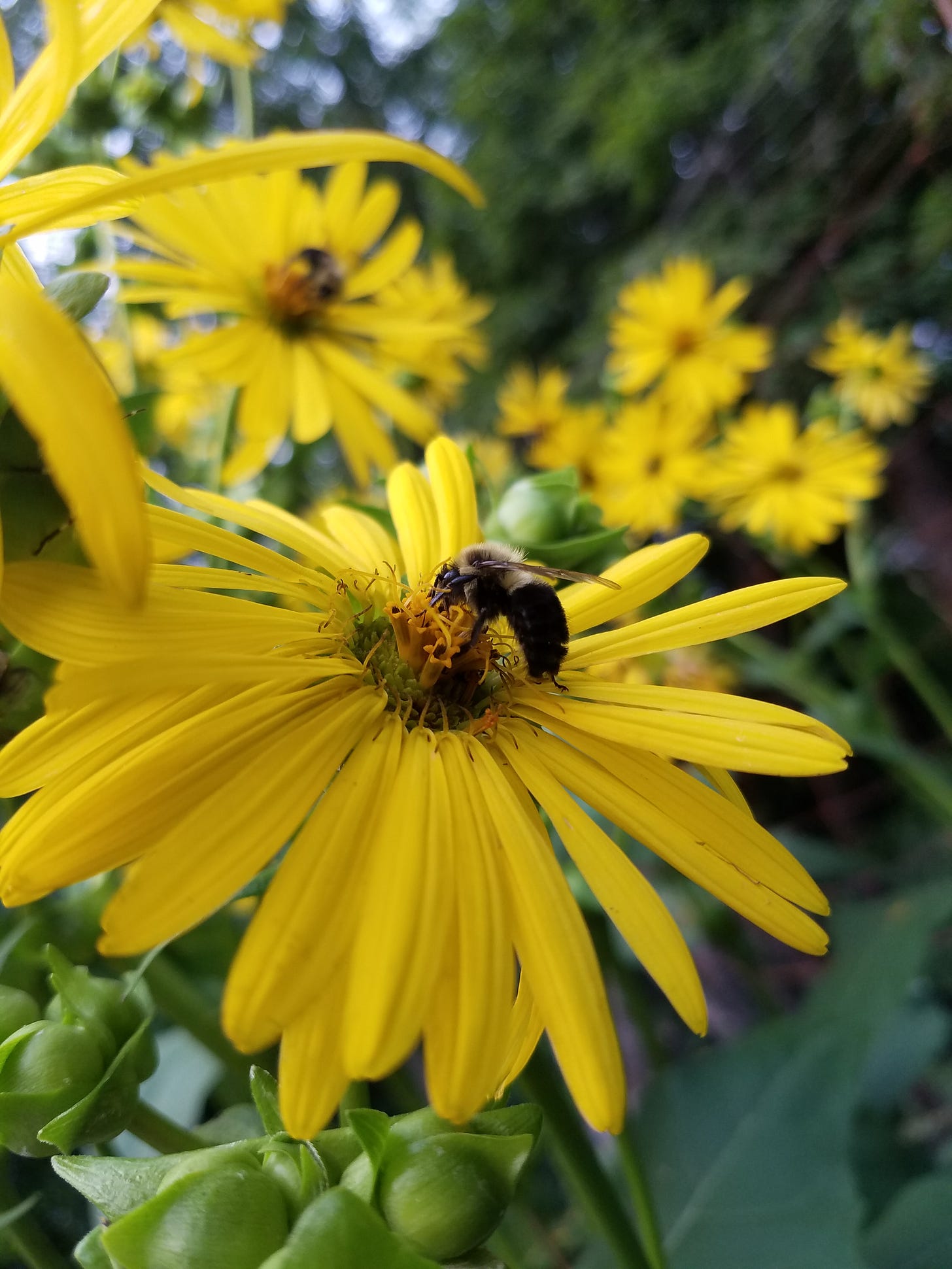
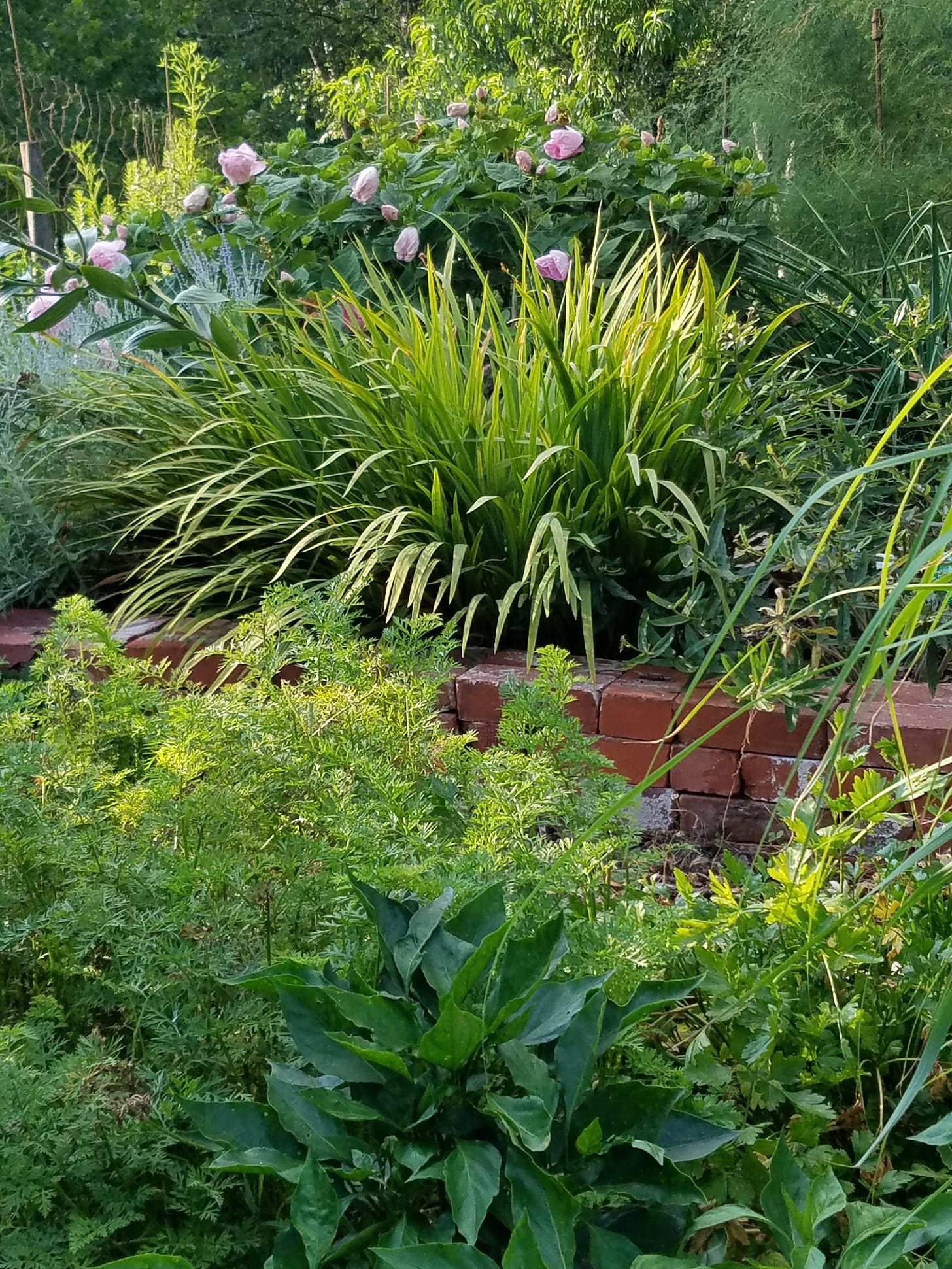
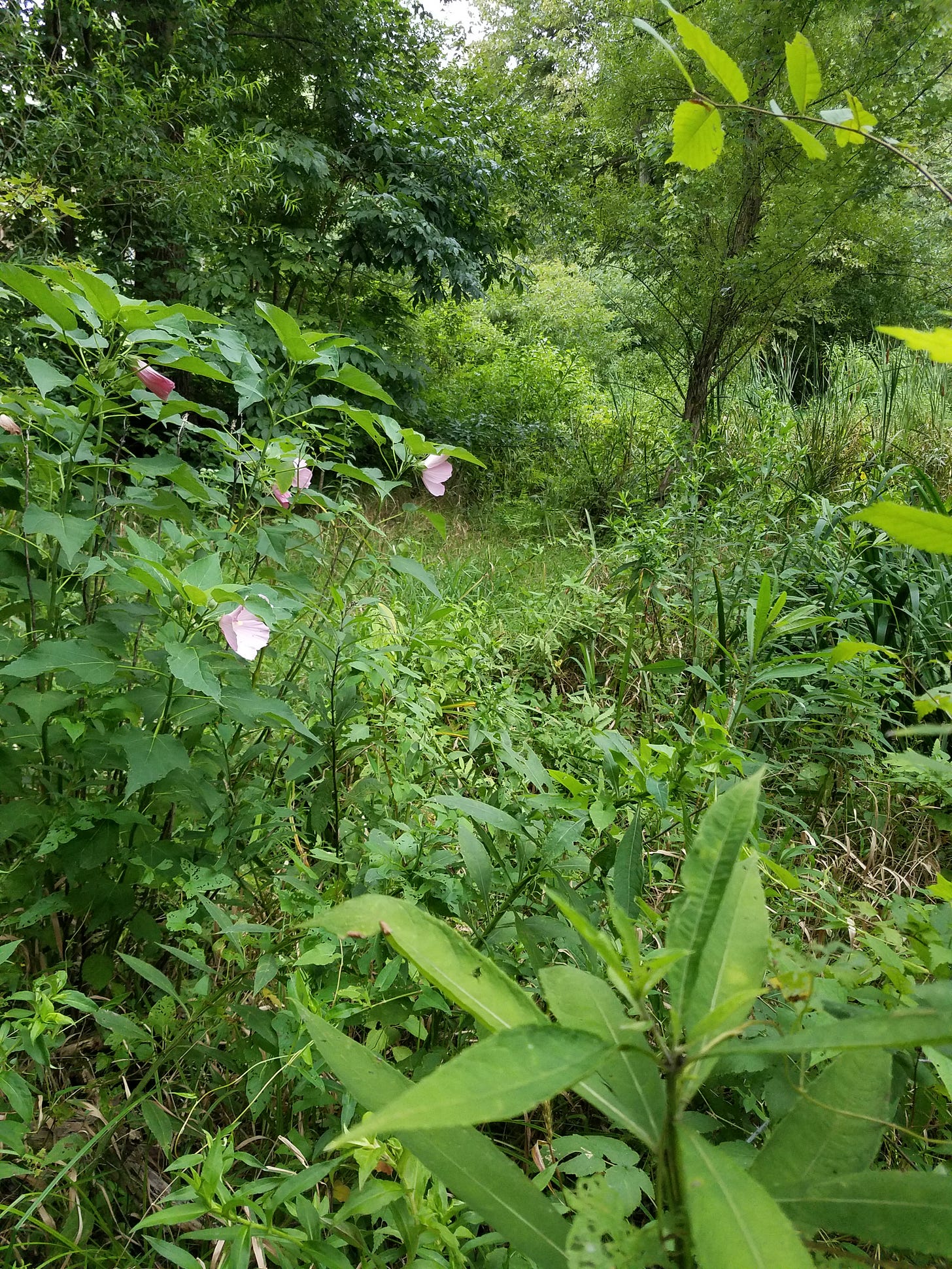
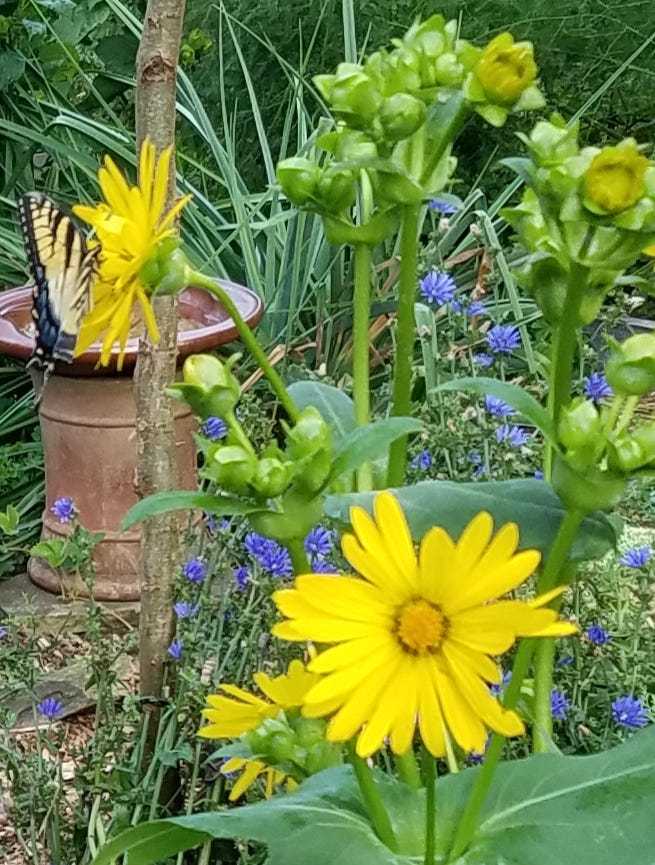
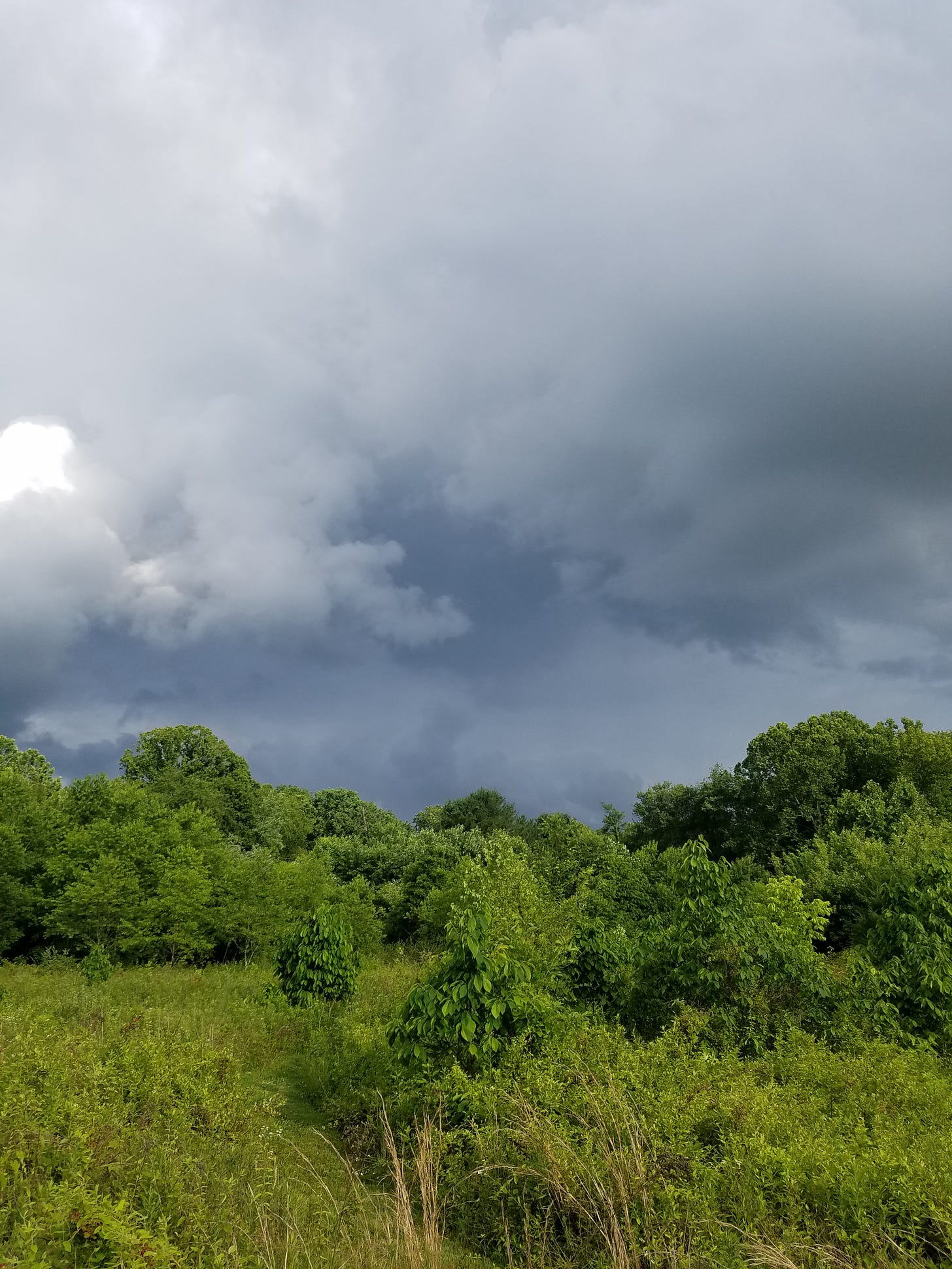
We had a beautiful patch of chicory at our old rental in the country. OUr dumb shit landlord sprayed it all out. Grrrrrrrrrrrrrrrrrr
Your gardens are delightful!